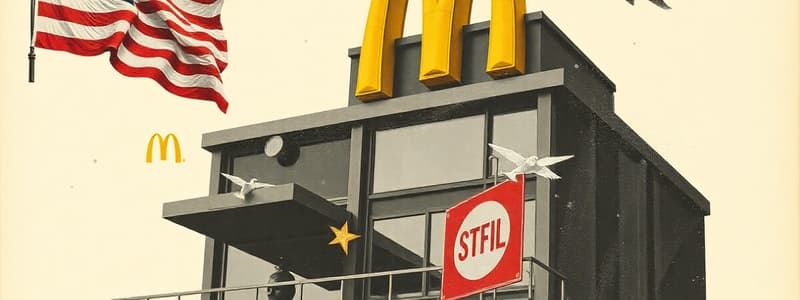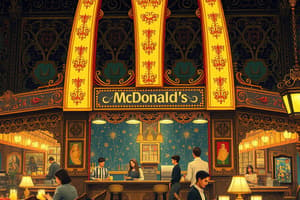Podcast
Questions and Answers
McDonaldization primarily focuses on improving the skills and expertise of the workforce through specialized training programs.
McDonaldization primarily focuses on improving the skills and expertise of the workforce through specialized training programs.
False (B)
McDonaldization is solely confined to the fast-food industry and has no impact on other sectors of the economy or social life.
McDonaldization is solely confined to the fast-food industry and has no impact on other sectors of the economy or social life.
False (B)
The irrationality of rationality, as described in the context of McDonaldization, refers to the absence of logical consistency in organizational policies.
The irrationality of rationality, as described in the context of McDonaldization, refers to the absence of logical consistency in organizational policies.
False (B)
McDonaldization increases workers' bargaining power by enhancing their skills and making them more difficult to replace.
McDonaldization increases workers' bargaining power by enhancing their skills and making them more difficult to replace.
The phenomenon of free consumer labor, exemplified by practices such as bussing tables or assembling furniture, is entirely unrelated to the principles of McDonaldization.
The phenomenon of free consumer labor, exemplified by practices such as bussing tables or assembling furniture, is entirely unrelated to the principles of McDonaldization.
McDonaldization primarily focuses on optimizing processes based on characteristics of fast-food restaurants such as effectiveness, creativity, uniqueness and autonomy.
McDonaldization primarily focuses on optimizing processes based on characteristics of fast-food restaurants such as effectiveness, creativity, uniqueness and autonomy.
George Ritzer's theory of McDonaldization suggests a move away from Max Weber's concept of bureaucracy due to changes in science, economy, and culture.
George Ritzer's theory of McDonaldization suggests a move away from Max Weber's concept of bureaucracy due to changes in science, economy, and culture.
Calculability, according to Ritzer's McDonaldization theory, emphasizes subjective evaluation of quality over quantifiable objectives.
Calculability, according to Ritzer's McDonaldization theory, emphasizes subjective evaluation of quality over quantifiable objectives.
The principles of McDonaldization—efficiency, calculability, predictability, and control—affect only the food Industry and have no impact on other aspects of society.
The principles of McDonaldization—efficiency, calculability, predictability, and control—affect only the food Industry and have no impact on other aspects of society.
Weber's bureaucracy is defined by flexible roles, diverse knowledge, subjective system of employment and the emotional-rationality authority.
Weber's bureaucracy is defined by flexible roles, diverse knowledge, subjective system of employment and the emotional-rationality authority.
Flashcards
McDonaldization
McDonaldization
The rationalization of production, work, and consumption based on fast-food restaurant characteristics.
McDonaldization Principles
McDonaldization Principles
Efficiency, calculability, predictability/standardization, and control.
Efficiency (in McDonaldization)
Efficiency (in McDonaldization)
Minimizing time in tasks and overall operations.
Calculability
Calculability
Signup and view all the flashcards
Predictability/Standardization
Predictability/Standardization
Signup and view all the flashcards
Control in McDonaldization
Control in McDonaldization
Signup and view all the flashcards
Irrationality of Rationality
Irrationality of Rationality
Signup and view all the flashcards
Devalued Labor
Devalued Labor
Signup and view all the flashcards
Reduced Bargaining Power
Reduced Bargaining Power
Signup and view all the flashcards
Free Consumer Labor
Free Consumer Labor
Signup and view all the flashcards
Study Notes
- McDonaldization, a concept by George Ritzer, describes the rationalization of production, work, and consumption that became prominent in the late 20th century.
- The core idea is that elements of fast-food restaurants – efficiency, calculability, predictability, standardization, and control – have been adapted and have far reaching impacts on society.
The McDonaldization of Society
- George Ritzer introduced the concept in his 1993 book, "The McDonaldization of Society".
- Since its introduction, the concept has become central in sociology, especially in the sociology of globalization.
- Ritzer defines McDonaldization as the adaptation of societal institutions and organizations to mirror the characteristics of fast-food chains.
- These characteristics include efficiency, calculability, predictability, standardization, and control.
How McDonaldization relates to Max Weber's Scientific Rationality
- Ritzer's McDonaldization theory is an update to Max Weber's theory of how scientific rationality produced bureaucracy.
- Weber viewed bureaucracy as the central organizing force of modern societies through much of the 20th century.
- Weber's modern bureaucracy was defined by characteristics such as hierarchical roles, compartmentalized knowledge and roles, a perceived merit-based system of employment and advancement, and the legal-rational authority of the rule of law.
- Ritzer argues shifts in science, economy, and culture have shifted societies away from Weber's bureaucracy towards McDonaldization.
Four Primciples of McDonaldization
- Efficiency focuses on minimizing the time needed to complete tasks or the entire production/distribution process.
- Calculability emphasizes quantifiable objectives ("counting things") over subjective evaluations of quality.
- Predictability and standardization are found in repetitive, routinized processes and consistent output.
- Control is used by management to make sure employees act consistently on a routine/daily basis.
- Control also involves using robots and technology to reduce or replace human employees.
- These characteristics are not only present in production, work, and consumption, but also affect values, preferences, goals, worldviews, identities, and social relationships.
- McDonaldization is a global phenomenon driven by Western influence, leading to a global homogenization of economic and social life.
The Downside of McDonaldization
- Ritzer argues the intense focus on rationality produces irrationality, creating unreasonable systems that deny basic humanity.
- Many people feel that reason is absent in transactions where organizations rigidly adhere to the rules/policies.
- Workers experience dehumanization under theses conditions.
- McDonaldization eliminates the need for skilled workers which devalues labor.
- Workers are in repetitive, routinized, focused tasks that can be taught quickly which leads to easy replacement
- Due to this, sociologists observe that workers' rights and wages are reduced.
- Companies include your labor into processes, like bussing your own table, assembling furniture, or self checkout.
- Society is now socialized to complete the production or distribution process for free, aiding a company in achieving efficiency and control.
- The characteristics transfer into things such as education and media with quantity being focused on more than quality.
Studying That Suits You
Use AI to generate personalized quizzes and flashcards to suit your learning preferences.





